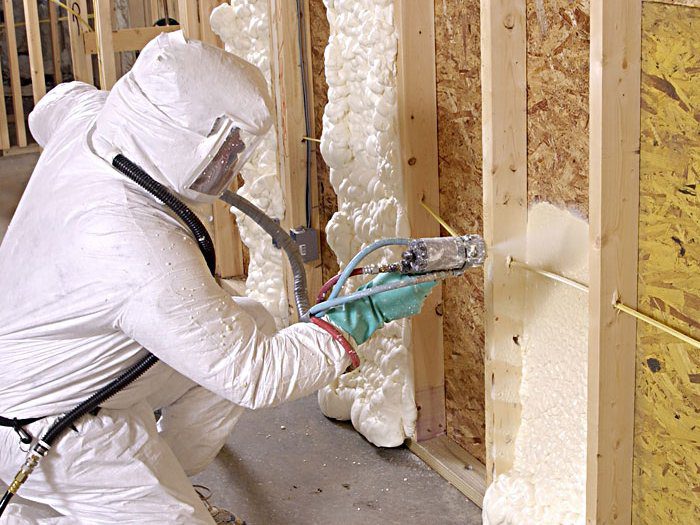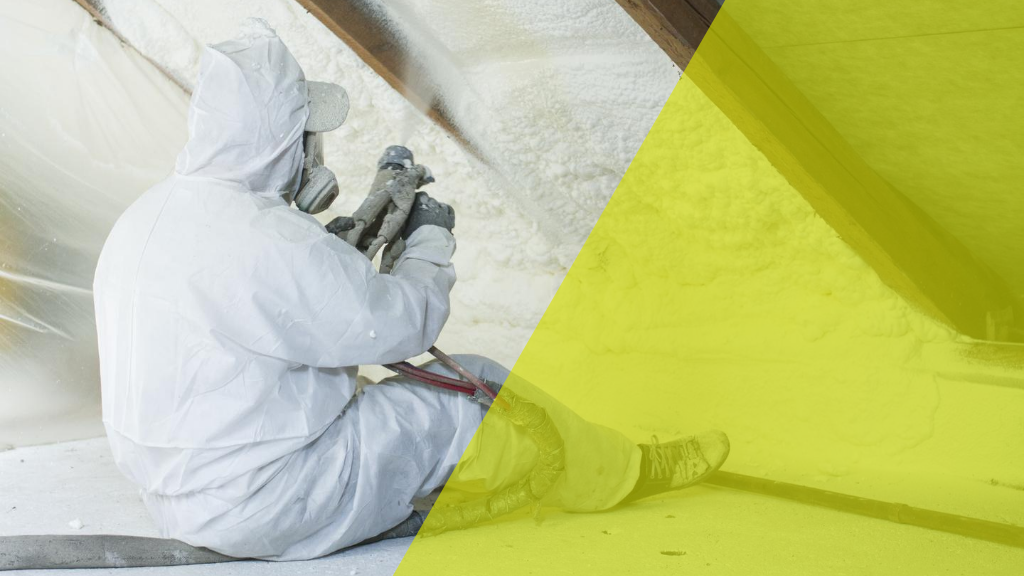Comparing Spray Foam to Standard Insulation: Which Is Better?
Comparing Spray Foam to Standard Insulation: Which Is Better?
Blog Article
Spray Foam: The Ultimate Option for Air Sealing and Insulation
Spray foam insulation has actually become a leading service for efficient air securing and thermal insulation, supplying a distinct mix of buildings that establish it aside from traditional methods. Its capability to increase and load spaces makes it specifically effective in avoiding air leak, which can considerably impact energy effectiveness. Nonetheless, understanding the complete extent of its benefits, installment processes, and comparisons with various other insulation kinds is essential for making notified decisions. As we discover these elements, the ramifications for both brand-new constructions and retrofits come to be significantly substantial. What elements should affect your choice?
What Is Spray Foam?
Spray foam is a functional insulation product that incorporates the principles of air sealing and thermal resistance to improve energy performance in buildings. Composed mostly of polyurethane or other similar substances, spray foam is used as a fluid that broadens upon call with surface areas, creating a strong, continuous layer of insulation. This unique residential or commercial property permits it to fill spaces, fractures, and spaces that traditional insulation products might ignore, providing a premium air seal.
There are 2 major sorts of spray foam: open-cell and closed-cell. Open-cell spray foam is lighter and a lot more flexible, using exceptional noise absorption and a reduced R-value per inch - Spray Foam. In contrast, closed-cell spray foam is denser, supplying a greater R-value, moisture resistance, and added architectural integrity to developing components
The application procedure normally involves specialized devices, making certain a seamless application that sticks to various substrates, including steel, wood, and concrete. This versatility makes spray foam appropriate for both new constructions and retrofitting existing frameworks. Its capacity to create a closed barrier significantly adds to reducing energy usage and boosting indoor air quality, consequently making it a recommended selection amongst homeowners and builders alike.
Advantages of Spray Foam Insulation
One of the most significant advantages of spray foam insulation is its outstanding ability to produce a constant air obstacle, which successfully decreases energy loss. Unlike conventional insulation materials, spray foam broadens to load splits and spaces, ensuring that air leakage is considerably decreased. This characteristic not just improves power efficiency yet likewise causes lower energy expenses with time.
Furthermore, spray foam insulation supplies remarkable thermal resistance, adding to a more stable interior environment. Its high R-value per inch enables efficient insulation in restricted rooms, making it perfect for attics, walls, and crawl spaces. The moisture-resistant properties of spray foam help protect against mold and mildew development, advertising healthier living conditions.
An additional important benefit of spray foam insulation is its sound-dampening qualities (Spray Foam). It properly decreases noise transmission in between spaces, producing a quieter and much more comfortable home atmosphere. The sturdiness of spray foam likewise sticks out, as it does not droop or resolve with time, preserving its performance throughout its life-span
Just How Spray Foam Functions
Comprehending how spray foam insulation functions is essential for appreciating its efficiency in air securing and thermal resistance. Spray foam insulation includes 2 primary components: isocyanate and polyol material. When these components are mixed, they undergo a chemical response that triggers the product to broaden quickly, developing a thick foam that fills tooth cavities, splits, and spaces.
As the foam Going Here increases, it complies with surface areas, developing an airtight seal that significantly lowers air infiltration. This particular makes spray foam insulation highly efficient at preventing drafts and dampness penetration, which can result in power loss and damage gradually. In addition, the closed-cell version of spray foam supplies premium thermal resistance as a result of its rigid framework, successfully minimizing warm transfer.
The special properties of spray foam enable it to adapt to uneven surfaces, ensuring thorough coverage and a smooth obstacle. As a result, spray foam insulation not just enhances power performance but likewise adds to improved interior air high quality by reducing the build-up of pollutants and irritants. Inevitably, recognizing the technicians behind spray foam highlights its function as an exceptional selection for insulation and air securing in both household and commercial applications.
Installation Process Review

Prior to setup, the space must be sufficiently cleaned up and prepped, making sure that surfaces are devoid of dirt, wetness, and particles. Due to the fact that pollutants can jeopardize attachment and general efficiency, i thought about this this step is critical. As soon as the location is prepared, the application includes blending the 2 parts of the spray foam, which expands upon get in touch with and fills up spaces effectively.
Educated experts must perform the installation, utilizing customized devices to ensure consistent protection and optimum density. Security precautions, including using protective equipment and making sure appropriate ventilation, are critical throughout this process. After application, the foam typically remedies swiftly, developing a strong obstacle that enhances energy performance.
Comparing Spray Foam to Conventional Insulation
When examining insulation choices, spray foam insulation stands apart in contrast to traditional products such as fiberglass and cellulose. One of the primary benefits of spray foam is its superior air securing capacities. Unlike fiberglass and cellulose, which can enable air infiltration, spray foam increases upon application, filling crevices and gaps to produce an airtight seal. This causes enhanced power performance, as less heated or cooled down air escapes the home, bring about lower energy bills.
Additionally, spray foam supplies a greater R-value per inch than standard insulation types, providing even more reliable thermal resistance in a thinner account. This characteristic is specifically useful go now precede with limited tooth cavity deepness. Spray foam is immune to wetness and mold development, which can be a considerable problem with cellulose and fiberglass, particularly in humid atmospheres.
Nevertheless, spray foam insulation usually carries a higher upfront expense than its typical equivalents. Homeowners have to consider this first investment against long-lasting power savings and efficiency advantages. Inevitably, while both insulation types serve their objective, spray foam becomes an advanced remedy for modern-day insulation needs, specifically in regards to air sealing and thermal effectiveness.

Verdict
In recap, spray foam insulation stands for a very reliable option for accomplishing optimal air sealing and thermal resistance. Its distinct properties, including moisture resistance and noise dampening, make it appropriate for different applications in both new buildings and retrofitting projects (Spray Foam). Although the first costs may be greater compared to conventional insulation products, the lasting benefits, such as considerable energy cost savings and improved indoor air top quality, justify the investment and emphasize its worth in modern building methods.
Spray foam insulation has actually emerged as a leading service for effective air securing and thermal insulation, offering an one-of-a-kind combination of residential properties that establish it apart from traditional techniques.Spray foam is a flexible insulation material that integrates the principles of air sealing and thermal resistance to boost energy performance in buildings.When examining insulation alternatives, spray foam insulation stands out in contrast to typical materials such as fiberglass and cellulose. Ultimately, while both insulation kinds serve their function, spray foam emerges as a much more advanced service for modern insulation requirements, specifically in terms of air sealing and thermal effectiveness.
In recap, spray foam insulation represents a highly effective option for achieving ideal air sealing and thermal resistance.
Report this page